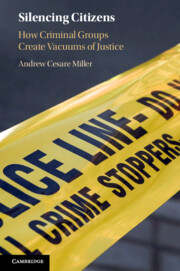3 - Theory
Cycles of Silence
from Part II - How Criminal Groups Prevent Cooperation
Published online by Cambridge University Press: aN Invalid Date NaN
Summary
This chapter details cycles of silence theory explaining how criminal groups constrain citizen cooperation with the police. Criminal group violence not only reduces cooperation by heightening retaliation risk to cooperators but also by making community norms favoring cooperation appear weaker than they are to citizens. Due to violence- induced retaliation risk, citizens who support cooperation are forced to keep that support private. The potency of social norms in driving human behavior means that this suppression of norms that favor cooperation ultimately reduce witnesses’ willingness to come forward with information. The chapter also interrogates the theory’s central premise that underlying support for cooperation exists in communities. Perceptions of police and criminal group legitimacy are an important driver of support, so cycles of silence dynamics primarily operate in communities where criminal groups have failed to gain legitimacy. The chapter then theorizes why criminal groups’ primary goal of illicit economic gain undermines their legitimization efforts.
Keywords
- Type
- Chapter
- Information
- Silencing CitizensHow Criminal Groups Create Vacuums of Justice, pp. 89 - 126Publisher: Cambridge University PressPrint publication year: 2024



